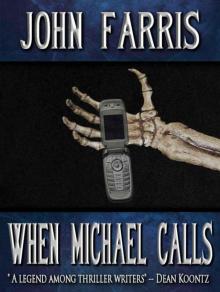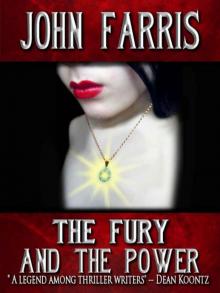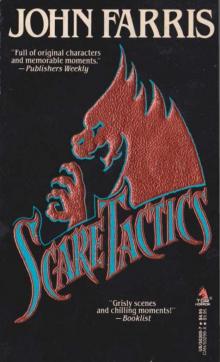- Home
- Farris, John
Captors Page 15
Captors Read online
Page 15
"Late last month Carol Watterson was kidnapped," he said, snapping his lighter shut.
Dev looked startled and then as he began to think about other possibilities his mouth opened slightly and he swallowed hard and his bright blue eyes sickened. Gaffney put an end to the reaction he'd been waiting to judge by saying, "She's home now. Either she escaped or was set loose. The kidnappers never attempted to collect the money they were asking."
"She's not—hurt, or anything."
"Carol's fine. They kept her prisoner in two ways: with drugs, and with a rope or chain attached to a dog collar around her neck. She remembers how she was kidnapped, but nothing of the six days that followed."
"Do you know who—"
"We have several leads that may be important. We have a description of one of the men involved. He may have been wearing a disguise. Would you look at the sketches of our suspect?" He took them from his case on the desk and handed them over. Dev stared at the man, with and without his shades and bushy hair. He shook his head slowly. "Am I supposed to know him?"
"We hoped you might recognize him."
"Sorry, I don't."
"Here are two more people we're interested in."
He gave Dev the photographs of Jim and Babs Hendersholt.
"I don't think—no, I'm sure I've never seen either of them. I don't know the name. They did it? Kidnapped Carol?"
"They could be implicated," Gaffney said, retrieving the photos.
"Does Carol know them?"
"She says not."
"Where did it happen?"
"Not far from her home, in Fox Village."
"And there was a ransom note?"
"It looked like a legitimate kidnapping in every way. They wanted two hundred twenty-five thousand. But they never followed through."
"Where are those two from? Berkeley?"
Gaffney looked approvingly at him. "A good hunch. Palo Alto."
"But they had to know Carol, or know something about her. I think her grandfather's worth a lot of money. Why didn't the kidnappers grab Carol on the Coast?"
"Apparently the plot took months to develop. They might have decided it would be simpler to take her in Fox Village."
"They doped her so she wouldn't know what was going on."
"That's the way it looks."
"Then how could she have escaped?"
"One of the drugs they gave her was experimental. They may have misjudged its potential."
"Good God," Dev said, shaking his head. "You're sure she's all right now?"
"Why don't you go see her?" Gaffney suggested.
Dev was silent for a long time. "That's what I came back for," he said in a low voice. "I wanted to see Carol again. It took time to decide that."
"How did you two happen to break it off?"
"We had fundamental differences. Maybe I didn't react well to the domestic situation we created. At the same time I felt—locked into the scientific establishment. Into subtle patterns of personal betrayal. I wanted to grow in other directions before I made the major decision about what to do with my life. She couldn't accept that I might still have doubts about what was right for me."
"Where have you been all this time, Dev?"
"Here and there. Spain. Portugal. Little villages mostly, places I doubt you've heard of. Most recently I was in Portimão; the Algarve's not so crowded now, you can still sleep on the beach. In another five years it'll be like the Costa del Sol." He dropped his cigarette on the floor, stepped on it. "Loafing's not my style anyway. I can't pretend I'm working while I try to learn how to put a painting together. Maybe I'll give Central America a try. I've got the language. I'll build something for somebody, teach school if I can."
"Taking Carol with you, Dev?"
"I'm going to give it a damn good try," Dev said seriously, and then he let a smile slip. "When I get up the nerve to go crashing in on her. Is that all you need from me?"
"That's all. Thanks."
Dev picked up his things. The reluctant smile appeared again. "In the beginning you must have thought I did it," he said. "Made off with Carol, I mean."
"In my line of work I have to think of everything."
"It isn't a bad idea, if that's the only way I can convince her she ought to be with me."
"Let me know first so I don't lose sleep over it, Dev. Lost too much already."
"Fair enough. So long."
"Luck," Gaffney said, shutting off the tape recorder.
As she usually did, Felice packed Sam's suitcase for him. She wanted to drive him to LaGuardia but Sam gradually discouraged her, pointing out that it would mean two tedious round trips in three days.
He put in a couple of manuscripts he was working on. "Hey," he said. "No shirts?"
Felice smacked her forehead lightly with her open hand and selected four shirts from a drawer, hesitated over a fifth. "Do you want this Gant with the clubby stripe?"
"Sure." He put his arm around her, kissed her glum face. "That's a long-range case of the blues you're working on. All that booze I fed you last week?"
Felice pressed a cheek against his shoulder. "No, I'm over that. I've never had such a depressing hangover. Ugh, three days of it was—a bit much." She closed her eyes and sighed. "I guess I'm a little blue at that. I'm going to miss you, that's why."
"I'm sorry to leave you stuck with a houseful of company."
"I don't mind. And it'll be good for Carol to have chums around." She left him, packed the shirts, checked items off a mental list, closed and locked the case and then stared at it, hands on hips, preoccupied.
Sam was watching her with a faint concerned smile. "Tell you what, Fels Whitlund isn't using his place at Fire Island much. We could borrow it for next weekend. Good clean sand and ocean and blue sky and food when we feel like it. No company. No TV. Just good music on that huge damn tape machine of Fels's and some competitive games if we're in the mood. A real throat-cutter, like Monopoly."
"And time to read a book or two," she said, brightening. "Oh, Lord! Wouldn't that be a miracle? I get so starved for books, and it's been such a mixed-up summer I haven't—"
"I'll call Fels right now," he promised.
She stopped him and fixed him with a fierce eye. But her tone was gentle. "You have been so awfully damned thoughtful and good to me lately."
"There's a lot of neglect to make up for," he said, properly contrite. "I'm tryin'."
"And you love me?"
"I love you."
Her face softened. "And do you still want me, Sam? Do you still want to make love to me?"
Sam was surprised, then shook his head chidingly. "What makes you think I've ever stopped wanting you?"
"Because we haven't made love. Not in weeks. And it bothers me when I want you so very much—"
He kissed her, not to quiet her but as if it had been on his mind for a long time and he didn't care to wait any longer.
"One more like that," Felice told him, heart unsteady, "and you don't go anywhere today."
"That's a thought."
"No, only kidding. I'll keep for the weekend. We'll keep. I think. Won't we?"
"Just barely," Sam said, as awed as she was.
On Monday, Felice kept a lunch date with an old school friend who lived in Greenwich, then did some hasty gift shopping at Altman's in White Plains on her way home. It was five-thirty when she turned into the birch-lined drive. There was a dusty, dark-blue Pontiac Le Mans in front of the house. Two boys were sitting on the top step of the porch as if they didn't know what to do next.
The drive wasn't wide enough for her to pull around the other car. She parked and got out. "I'm Felice," she said. "Hello. I don't know where Carol could be."
They were quite different from each other and not what she had expected. The big one looked as if he had come of age by being banged around a lot. He had the kind of sloping, powerful shoulders and muscular neck and close-cropped, smallish head that reminded her of mountain cats. He had casual ways and a grin that was ea
sy to take. He looked too old for college, perhaps ten years older than his companion, but it was difficult to tell. The second boy was, perhaps, Mexican, with a skin that was the color of old redwood in the dimming light. He had his share of Indian blood, apparent in the bones of his face and the impenetrable eyes, but his mouth was full, with an unexpected softness that was not womanish but graceful and appealing. His hair style was pure mod. He seemed shy and not at ease. Felice liked him instantly.
"Hi," the big one said. "Rich Marsiand. This is Arturo Regalo."
"Turo," the boy murmured, with a nod of his head that was close to a bow, and he waited with an attempt at nonchalance he might have copied from his friend, who clearly would be at home wherever he happened to be standing.
"I hope you boys haven't been waiting long."
"Not long," Rich said. "We walked around. You certainly have a beautiful place here."
"Thank you. Was Carol's car in the garage?"
"A blue Sting Ray?"
"That's the one. She couldn't have gone far; she's probably next door at the General's. You boys look as if you've had a long drive, so why don't we get you settled in? I'm sure Carol will be along in a few minutes."
They had three suitcases between them. Felice gave them the largest of the bedrooms on the second floor. In her own room she changed, went down to the kitchen. She hummed to herself as she put boned and breaded chicken breasts into a glass dish to bake. By the time the boys came down the back stairs she had completed her other preparations for dinner.
Rich drank Southern Comfort neat. Turo liked B and B. Felice fixed a brandy for herself and took them to the side porch, where it was already dark enough for lamps. Even before they settled down she saw Carol coming, the General towering and gimpy beside her.
She was carrying a falcon on her wrist, a thin and misbegotten-looking bird who appeared to have accidentally flown into a fan. He sat docilely enough on the falconer's glove the General had provided, but he had a fevered, murderous eye, which made Felice distinctly uneasy. She hoped the two of them knew what they were doing. Wild hawks never bothered men; only the ones trained to be unafraid sometimes turned disastrously on their captors.
"He's mine!" she said jubilantly to Felice as they came up to the porch. "He ate for me, and he's mine. I'm going to train him myself. Hey, now, Rich! Turo. Good to see you. Sorry I'm late. Let me put Bird here on the back porch."
"On Riggs's porch?" Felice said doubtfully.
"Oh, Riggs won't mind, he's entertaining an elegant bitch on the other side of the pond. Excuse me! Rich Marsland, Turo Regalo, this is my grandfather, General Henry Phelan Morse, you es ay ret."
"You're the revolutionaries," the General said, offering his knobby hand.
"But soft-spoken," Rich said. He had an inch or two on the General—also a good crushing grip, as Felice was pleased to notice. The two men looked each other in the eye like strategists.
"Where are the love beads, boys?" the General said, just managing not to sound nasty.
Felice saw Carol compute his mood with a dark glance. "Now, don't start," she said. "You promised."
"That's not my style," Rich told the General, with an imperturbable smile.
Felice glanced at Turo Regalo. He was on his feet, looking stiffly correct in fussy modish clothes. His lack of expression was nearly deathlike.
"Got any pot on you, Mr. Marsiand?" The General was still in Rich's grip, or perhaps it was the other way around; Felice didn't know. She knew this sort of confrontation was childish of her father, and that annoyed her. A couple of significant clues she had learned to look for confirmed that the General had begun his cocktail hour about eleven that morning. It had been happening too frequently of late. Something was bothering him, then. She had no idea what it could be.
At this stage he could go either way: he could settle down and taper off and be amiable company, or he could start drinking in earnest and be a bastard.
"I don't believe in grass, General," Rich Marsland explained, making the vernacular correction. He was as comfortable as if he'd been coping with the old man all his life. "I think it may be a dangerous drug. Anyway I know it's bad for the system."
"That Southern Comfort you've got in your hand can be dangerous if you're not accustomed to it," the General observed, in a voice that told its own story about Southern Comfort.
"Well," Rich said easily, holding the glass up to the light, "this is the kind of danger I like to be in."
The General stared at him, lower lip protruding, eyes hooded, spectral, unreadable; then he bellowed a laugh. As if by mutual consent they let go of each other. Felice glanced at Carol, who had been waiting uncertainly; now she turned and rushed off with her bird. Felice smiled as indulgently as she could.
"Can I fix you something, General? We'll have dinner in half an hour. I hope you're staying."
"Sure. A little Comfort. Don't overdo me, honey. Boys? Sit down. I'm going to tell you why I damn well don't trust anybody under thirty."
Dinner went smoothly. Everyone had an appetite except Turo, who sat next to the General and seemed to regret it. He picked at his food but drank two glasses of the Rhone wine. He said almost nothing, deferring to Rich. In a complex way he seemed to be dependent on Rich without actually being a satellite or psychologically in debt to him. Felice saw that he stared often at Carol, who was at her best, stunning in a simple beige dress she'd put on for dinner, her skin honey-dark and her eyes large and lustrous, lips a pale, frosted pink, hair very pale and pulled back, loose over one bare shoulder. She joked and laughed a lot. Felice felt very proud of her. Naturally she had eyes for Rich. Turo seemed to know and accept this. Felice wondered if Turo had a crush on her daughter. He was so serious and poignantly reserved, and she felt a tender sorrow for him.
They took their coffee to the porch.
"Leeches," the General said, in what for him was a jovial tone of voice, "nothing but a pack of goddam leeches and jackals sucking at the vitals of this nation! None of you has what it takes to rise up on his back legs and say, By God I'm a Red and I'm proud of it!"
Arturo grimaced. Felice regarded her father with a mild glower. Rich, as usual, was smiling nervelessly. The General had badgered him all through dinner, ignoring Felice's efforts to get him off The Subject. Rich had, with deftness and subtlety, badgered back.
"We're a mixed bag, General, in the hip sense of the word. We all have our particular bags, our beliefs, our plans for a better world. Maybe there are some hard-core Marxists involved in the Movement, but a very few. Because the young are idealists, not dogmatists. A good many of us are sentimental and elect heroes like Che. That's harmless as far as it goes; don't label us or write us off because of our need for heroes: who has the Establishment provided lately? I dig Che and I dig Billy Graham, for very different reasons. Just say revolutionaries, General. That's what we are. And as activists it's natural that we do some belly-biting in our confrontations, because that's what offends us most—the gross, self-satisfied, swollen underbelly of the country we were born in, and would like to find a home in if it isn't too late."
"Revolutionaries? You don't even know what you're doing most of the time. All we get from you is provocations and platitudes. Now, those boys in Paris knew how to pull it off. Barricades! Siege. Diversionary tactics. Of course they went to a good school, I have to admit it; they learned their tactics from the pros in Moscow."
Rich said, impiously but perhaps seriously, "Maybe what we need is a pro to help our takeover, General. Someone with your savvy."
"Help you pull this country down into the muck? Pull it down where every bloody-minded little anarchist can piss on our heritage and our institutions?"
"Now, General," Felice said, because it did sound as if he was going to get genuinely wrought up instead of pleasantly fervid.
"Yes, we could use your help, General. I think you're an honest man, and we need an honest man to tell us the truth, help us search out what is good and usable and worth preserving in
our society. You can't be all that satisfied with things as they are. Help us. If a few institutions should tumble in the process, well and good. Institutions aren't necessarily valuable, General. Only ethics have lasting value."
"We're learning a new set of ethics, and adapting them to our requirements," Turo said gravely, and everybody was a little surprised that he had spoken.
The General studied him with a thoroughness meant to be intimidating. "You're not an American, are you?" It was rude but not cutting. Arturo Regalo swallowed and there was a flash of temper in his normally placid eyes. Felice decided that he hadn't participated before because he was mortally afraid of being offended and disgracing himself with his temper.
"I've always been an American," Turo explained. "Since the age of fourteen I've been a United States citizen."
"Do you have any love for this country?" the General demanded.
"Yes, sir. I have a great deal of love for it."
"Señor Regalo, an honorable man doesn't kill what he loves."
Turo flinched slightly from anger but held the General's gaze. It was quiet on the porch. Rich was not smiling now; he looked intent and possibly displeased. ibro said in a dry controlled voice, "An honorable man kills only what is degenerate, and wanton, and destructive. He kills when he has no other choice but to kill."
The General sipped his after-dinner coffee. "You've given that a lot of thought," he said at last.
"I've given it a lot of thought," Arturo replied, and he was trembling.
"Arturo's a killer, all right," Felice heard Carol say good-humoredly. "With a pool cue."
"That so? Fancy yourself pretty good with a stick, Turo?"
Turo looked confused, then abashed. He glanced at Carol, who grinned reassuringly at him.
"I play a little pool myself," the General allowed.
"Oh-oh," Carol said in a bantering tone. "Now what have I done?" But she looked relieved; the tension was going.
"For money," the General said. "I'm strictly a money player. That's not your game, probably."
"I've been there," Turo told him, with a quick glittering smile, and nothing at all in his eyes. "How about you, Rich?"

 Sacrifice
Sacrifice Wildwood
Wildwood Fury
Fury Captors
Captors When Michael Calls
When Michael Calls Fury and the Power
Fury and the Power Dragonfly
Dragonfly Scare Tactics
Scare Tactics